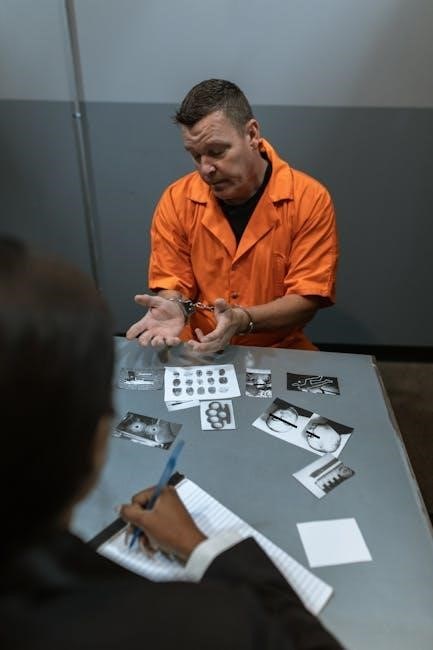The “4000 Questions for Cross Examination in Criminal Cases PDF” is a comprehensive resource designed to aid legal professionals in challenging evidence and testimony effectively․
The Importance of Cross-Examination in Criminal Trials
Cross-examination is a cornerstone of criminal trials‚ enabling the defense to challenge the prosecution’s evidence and testimony․ It is a critical tool for uncovering inconsistencies‚ exposing lies‚ and revealing the truth․ Effective cross-examination ensures accountability and fairness‚ safeguarding the accused’s rights․ The “4000 Questions” resource provides strategic questions to help attorneys strengthen their case‚ making it an invaluable asset for legal professionals seeking to ensure justice and protect the innocent․
Overview of the “4000 Questions for Cross Examination in Criminal Cases PDF”
The “4000 Questions for Cross Examination in Criminal Cases PDF” offers a structured collection of questions tailored for various witness scenarios and case types․ Authored by legal experts‚ this resource provides attorneys with strategic tools to challenge evidence and testimony effectively․ It serves as a practical guide‚ ensuring that legal professionals are well-prepared to conduct cross-examinations that uncover inconsistencies and build persuasive narratives‚ ultimately strengthening their cases and upholding justice․

Historical Context and Development of Cross-Examination Materials
The evolution of cross-examination materials traces back to foundational works like S․ K․ Shanglo’s 1990 and 1991 editions‚ with modern resources like the 4000 Questions PDF refining these strategies․
Evolution of Cross-Examination Techniques in Criminal Law
Over decades‚ cross-examination techniques have evolved significantly‚ with early foundational works by S․ K․ Shanglo in the 1990s laying the groundwork for modern strategies․ The “4000 Questions for Cross Examination in Criminal Cases PDF” reflects this progression‚ offering refined approaches to challenging evidence and testimony․ These resources emphasize strategic questioning‚ impeachment tactics‚ and uncovering inconsistencies‚ adapting to contemporary legal challenges while maintaining the core principles of effective cross-examination․
Key Authors and Publications on Cross-Examination Questions
Authors like S․ K․ Shanglo and R․ Chakraborty have significantly contributed to cross-examination literature․ Their works‚ such as “Selected Questions for Cross-Examination in Criminal Trials” and “4500 Questions for Cross Examination‚” provide invaluable insights․ These publications‚ including the “4000 Questions for Cross Examination in Criminal Cases PDF” by S․ Panduranga‚ offer structured approaches to challenging evidence‚ making them essential resources for legal professionals seeking to strengthen their cross-examination strategies and effectively represent their clients․

The Structure and Content of the “4000 Questions” Resource
The “4000 Questions” resource is meticulously organized‚ offering categorized questions tailored to specific case types and witness scenarios‚ ensuring legal professionals can effectively challenge evidence and testimony․
Organization of Questions by Case Type and Witness Situation
The “4000 Questions” resource systematically categorizes questions based on specific criminal case types‚ such as homicide‚ theft‚ and assault‚ ensuring relevance and adaptability․ Witness-specific scenarios‚ including victim‚ defendant‚ or expert testimonies‚ are addressed with tailored inquiries․ This structured approach allows legal professionals to quickly identify and apply appropriate questions‚ enhancing the efficiency and effectiveness of cross-examination․ The organization ensures that attorneys can strategically challenge evidence and testimony‚ aligning with the unique demands of each case․
Strategic Use of Questions to Challenge Evidence and Testimony
The “4000 Questions” PDF provides attorneys with strategically crafted questions to challenge evidence and testimony effectively․ These questions are designed to uncover inconsistencies‚ biases‚ and potential coached responses․ By employing these inquiries‚ legal professionals can impeach witnesses‚ weaken opposing arguments‚ and strengthen their own cases․ The resource emphasizes the importance of persuasive narratives‚ ensuring that cross-examination not only reveals truths but also shapes a compelling story for the jury‚ thereby influencing trial outcomes decisively․

Legal Significance of Cross-Examination in Criminal Cases
Cross-examination is a cornerstone of criminal justice‚ ensuring the accused’s right to challenge evidence and testimony․ Courts emphasize its role in uncovering truths and upholding fairness in trials․
Court Precedents Emphasizing the Role of Cross-Examination
Court precedents consistently highlight the critical role of cross-examination in criminal cases․ In ROBERT MCCOY v․ LOUISIANA‚ the Supreme Court underscored its importance as a fundamental right‚ ensuring the accused can challenge evidence․ Cases like People v․ McCloud and State v․ Johnson further emphasize its necessity in uncovering inconsistencies and biases in testimony․ Courts have repeatedly stressed that effective cross-examination is essential for fairness and justice‚ directly impacting trial outcomes and the integrity of the legal process․
Impact of Effective Cross-Examination on Trial Outcomes
Effective cross-examination significantly influences trial outcomes by challenging evidence and testimony; Strategic questioning can expose inconsistencies‚ undermine credibility‚ and weaken the prosecution’s case․ In criminal trials‚ a well-executed cross-examination can lead to favorable verdicts or reduced charges․ The “4000 Questions” resource provides attorneys with tools to craft compelling narratives‚ potentially swaying jury decisions․ By highlighting flaws in the opposing side’s arguments‚ skilled cross-examination can vindicate the innocent and ensure justice is served‚ making it a pivotal aspect of criminal proceedings․

Psychological and Strategic Aspects of Cross-Examination
Effective cross-examination leverages psychological tactics to uncover inconsistencies and biases‚ strategically challenging testimony․ The “4000 Questions” resource provides structured approaches to reveal truths and weaken opposing arguments․
Techniques to Uncover Inconsistencies and Bias in Testimony
The “4000 Questions” resource provides systematic approaches to expose inconsistencies and biases in witness testimony․ By targeting prior statements‚ contradictory evidence‚ and potential motives‚ attorneys can challenge credibility․ Strategic questioning techniques‚ such as highlighting contradictions and probing for hidden agendas‚ are emphasized․ These methods help reveal biases and undermine the reliability of testimony‚ strengthening the defense’s position in criminal cases․
Building a Persuasive Narrative Through Cross-Examination
Effective cross-examination involves crafting a compelling narrative that aligns with the defense’s theory․ The “4000 Questions” guide offers strategies to frame questions that highlight key evidence and contradictions․ By systematically challenging witness accounts‚ attorneys can create doubt and present an alternative perspective․ This structured approach ensures that each question contributes to a cohesive story‚ making the defense’s argument more persuasive and impactful in the courtroom․

Case Studies and Examples from the “4000 Questions” PDF
The “4000 Questions” resource includes real-life applications and examples‚ demonstrating how strategic questioning can challenge evidence and testimony effectively in criminal cases․
Practical Applications of Cross-Examination Questions in Real Cases
The “4000 Questions” resource provides practical examples of cross-examination strategies in real criminal cases‚ demonstrating how attorneys can effectively challenge witness testimony and evidence․ By using targeted questions‚ lawyers can uncover inconsistencies‚ expose biases‚ and discredit opposing witnesses․ These examples highlight how strategic questioning can weaken the prosecution’s case and strengthen the defense․ The resource also offers insights into building persuasive narratives and impeaching credibility‚ making it an invaluable tool for legal professionals seeking to master cross-examination techniques․
Lessons Learned from Successful Cross-Examination Strategies
Successful cross-examination strategies emphasize thorough preparation‚ strategic questioning‚ and the ability to adapt during testimony․ The “4000 Questions” resource highlights the importance of uncovering inconsistencies in witness testimony and challenging evidence effectively․ Key lessons include the need to focus on credibility‚ use open-ended questions sparingly‚ and build a persuasive narrative․ Additionally‚ understanding the witness’s background and potential biases is crucial․ These strategies underscore the value of cross-examination in achieving favorable trial outcomes and upholding justice․

Modern Applications of Cross-Examination in Criminal Justice
Modern cross-examination integrates technology and adaptive techniques‚ enhancing preparation and execution․ The “4000 Questions” resource reflects contemporary legal challenges‚ aiding attorneys in refining their strategies effectively․
Adapting Cross-Examination Techniques to Contemporary Legal Challenges
Modern criminal justice demands adaptive cross-examination techniques to address evolving legal challenges․ The “4000 Questions” resource offers tailored strategies to tackle digital evidence‚ forensic expert testimonies‚ and witness credibility in today’s complex cases․ Attorneys must integrate psychological insights and technological tools to uncover inconsistencies and biases effectively․ This approach ensures cross-examination remains a powerful tool for challenging evidence and upholding justice in an ever-changing legal landscape․
The Role of Technology in Enhancing Cross-Examination Preparation
Technology has revolutionized cross-examination preparation by providing digital tools to organize and analyze evidence effectively․ The “4000 Questions” resource leverages technological advancements‚ enabling attorneys to categorize questions digitally and anticipate witness responses․ Video analysis software allows lawyers to study witness demeanor and identify potential weaknesses․ Additionally‚ AI-driven platforms can predict gaps in evidence‚ helping attorneys refine their strategies․ These innovations ensure cross-examination preparation is more efficient‚ thorough‚ and strategically aligned with modern legal demands․
The “4000 Questions” resource is a valuable tool for legal professionals‚ offering comprehensive insights to enhance cross-examination strategies and ensure justice is served effectively in criminal cases․
The Value of the “4000 Questions” Resource for Legal Professionals
The “4000 Questions” PDF is a highly structured resource offering practical cross-examination strategies tailored for criminal cases․ It provides legal professionals with a vast array of pre-prepared questions organized by case type and witness situation‚ enabling them to challenge evidence and testimony effectively․ This comprehensive guide not only streamlines trial preparation but also empowers attorneys to uncover inconsistencies‚ expose biases‚ and build persuasive narratives‚ ultimately enhancing their ability to advocate for their clients․ Its versatility and depth make it an indispensable tool for both novice and seasoned practitioners‚ ensuring that justice is served through robust and strategic cross-examination techniques․
Future Trends in Cross-Examination Practices
Future trends in cross-examination will likely involve enhanced use of AI-driven tools to dynamically adjust questions based on witness responses and predictive analytics to assess credibility․ Multimedia evidence will become more prevalent‚ and VR simulations may train lawyers․ Data security will be prioritized to protect sensitive information․ Global collaboration could standardize practices‚ with resources like the “4000 Questions” PDF evolving to include AI-generated‚ adaptive questions and multimedia elements‚ making cross-examination more effective in digital court settings while maintaining ethical standards․